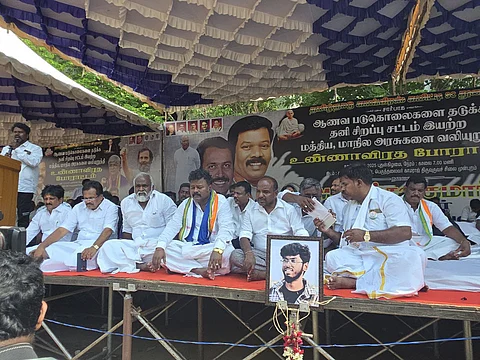

Following the brutal murder of 27-year-old Dalit youth Kavin Selvaganesh, the Tamil Nadu Congress Committee (TNCC) held a protest demanding that the state government pass special legislation against so-called ‘honour’ killings. The protest, held on August 6, was called by the TNCC’s Scheduled Caste (SC) wing and held at Sathyamurthy Bhavan, the party’s Chennai headquarters.
The caste killings of intercaste couples are often referred to as ‘honour’ killings.
The protest was attended by TNCC SC wing chairperson Ranjan Kumar, All India Congress Committee (AICC) spokesperson and TNCC vice president SM Hidayathulla, former TNCC president KV Thangabalu, Congress MLA S Rajesh Kumar, organiser in-charge C Ram Mohan, TNCC vice president A Gopanna and VCK MLA SS Balaji, among others.
Speaking to TNM, Ranjan said, “Despite existing laws, such murders continue to happen. Evidently special legislation is required. A special law would benefit others, apart from Dalits." He pointed out how the Protection of Children from Sexual Offences (POCSO ) Act was passed to cover gaps in existing laws.
Ranjan also said that casteism exists even in the police ranks. “The law is applied differently to oppressor castes and to the rich. If a poor, lowered caste person commits a crime, police harass their whole family. If the same crime is committed by a rich, oppressor caste person, the police go soft on them,” he said.
Asked if the Congress would exert pressure on the ruling Dravida Munnetra Kazhagam (DMK), Ranjan said, “There is no hesitation from the DMK. We fully believe they will pass a special law soon. The state has regressed a lot because of the AIADMK (All India Anna Dravida Munnetra Kazhagam) and the RSS (Rashtriya Swayamsevak Sangh). We have to remedy that. We fully believe as coalition partners that the demands for a separate law will be met.”
Ranjan added, “We are an independent party. We have always taken up the people’s concerns. We will certainly press the state government to pass a special law.”
Hidayathulla said that his party has started building pressure on the state government with the August 6 protest. Asked about Stalin's statement in 2024 that there is no requirement for special legislation against ‘honour’ killings, Hidayathulla replied, “Maybe in the past it was unnecessary, but right now it is a need. We need a separate law if such killings happen even in Periyar’s land, under a government which is unique in the country for promoting social justice. It is the need of the hour.”
Protesters say that while stricter laws are needed, caste pride cannot be dealt with only through punishments.
Prem Kumar, a TNCC SC wing member from Salem, said that caste or religious supremacy cannot be resisted through laws alone. He added that the quality of education plays a significant role in casteist indoctrination.
“Education should be enlightening, not about scoring high marks. Just learning (A+B)2 will not feed you. Institutions that have caste names should not get approval. In such institutions, children see caste names each time they open a book. The word ‘honour’ must not be used in the context of caste-motivated killings,” he said.
“The person who created the nuclear bomb [Oppenheimer] knew that it would kill so many people. Despite being highly educated, he still built it. Similarly, it is the highly educated people in this country who propagate caste: the bureaucrats and leaders. Society has to change. The law cannot help with that,” Prem added.
He also said that political parties are reluctant to bring in meaningful change. “They make calculations based on coalition interests and vote banks. Parties know that if they are not seen siding with the victim, they will lose the votes of the victim’s community. But if they take action, they will lose the votes of the oppressor caste.”
Kamaraj, also from the Salem SC wing, questioned public discourse after Kavin’s murder. “People asked, ‘Why couldn’t he have had a relationship with someone from his own caste?’ How do they get the courage to say something like this openly? Such people should also be punished by the law.”
Long-standing demand for special legislation
Notably, also on August 6, Left parties and the Viduthalai Chhiruthaigal Katchi (VCK) submitted a joint letter to Chief Minister MK Stalin similarly calling for special legislation.
But the demand for special legislation against ‘honour’ killings is not new.
The Communist Party of India (Marxist) demanded a special law in 2015.
In 2022, the Dalit Human Rights Defender Network, a coalition of anti-caste activists and organisations, proposed a 17-page people’s draft bill titled ‘The Freedom of Marriage and Association and Prohibition of Crimes in the Name of Honour Act’. This bill asked for special protections for inter-caste couples. The draft bill pressed for better protection for victims and their families. It suggested identifying areas prone to caste violence and banning caste-based kangaroo courts or kattapanchayaths.
The draft bill also provided a comprehensive list of the ways in which inter-caste couples are victimised, including through social exclusion and eviction from areas of residence, aside from outright physical violence. Further, the bill recommended providing protection against all crimes committed in the name of ‘honour’ and motivated by caste, faith, age, gender, sexual orientation, language, class, race, status and tradition.
The bill was submitted to Stalin in September 2022.
In 2024, the CM claimed in Assembly, “I believe handling the cases in a proper manner and bringing the accused before the law is a better solution than bringing in new legislation.”
Also in 2024, the CPI(M)’s affiliate, the Tamil Nadu Untouchability Eradication Front (TNUEF) held protests in Chennai reiterating the demand for a special law.
Activists have repeatedly emphasised that the Scheduled Castes/Scheduled Tribes (Prevention of Atrocities) Act has gaps.
Two days after Stalin dismissed the need for special legislation, Madurai witnessed a horrific caste killing. Both the victim and the woman he had been in a relationship with were from different Dalit communities.